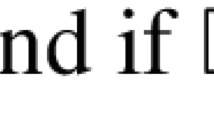Abstract
What do you know when you know what a sentence means? According to some theories, understanding a sentence is, in part, knowing its truth-conditions. Dorit Bar-On, Claire Horisk, and William Lycan have defended such theories on the grounds of an “epistemic determination argument” (“EDA”). That argument turns on the ideas (a) that understanding a sentence, along with knowledge of the non-linguistic facts, suffices to know its truth-value, and (b) that being able to determine a sentence’s truth-value given knowledge of the non-linguistic facts is knowing its truth-conditions. I argue that the EDA withstands the objections recently raised by Daniel Cohnitz and Jaan Kangilaski, but fails for other reasons. It equivocates between a fine-grained and a coarse grained conception of “facts.”
Similar content being viewed by others
Notes
Is there a fine-grained fact that algunas marmotas comen garbanzos, in addition to the fact that some woodchucks eat chickpeas? It seems there must be. ‘Algunas marmotas comen garbanzos’ is equally well translated into English by ‘Some woodchucks eat chickpeas’ and ‘Some groundhogs eat garbanzos’. If the fine-grained fact that algunas marmotas comen garbanzos is the same as the fine-grained fact expressed by its English translation, then the transitivity of identity would give us the unwanted result that the fine-grained fact that some groundhogs eat garbanzos is the same as the fine-grained fact that some woodchucks eat chickpeas. This suggests that someone who knows all the fine-grained facts has to know all languages.
Lycan may not be right. Maybe (M2) is the obvious explanation of (M-Det), but that would be so only if the totality of fact does not already suffice to determine the truth-value of any given sentence. The trouble with bricks is not that they are concrete. The trouble with bricks is that any given possible world selection already suffices to determine their colors; being “given” the brick is redundant. What Lycan really needs is not an assurance that meanings are sufficiently abstract for us to infer that they are functions, in light of (M-Det). What he needs is an assurance that the totality of fact (M-Det) cites is not sufficient in itself to determine a sentence’s truth-value, before we raise any questions of meaning at all.
A proponent of EDA might try splitting the difference between coarse-grained and fine-grained facts, by casting the argument in terms of knowing coarse-grained facts under appropriate modes of presentation. Then (E-Det) might hold up; if you know what a sentence means, and you know the relevant facts under the appropriate modes of presentation, then you know the sentence’s truth value. The problems here are similar to the problems that arise on the fine-grained conception of facts. We have to interpret (KTC) as saying that knowing enough to assign a sentence a truth value given knowledge of the relevant coarse-grained facts under the relevant modes of presentation is knowing a truth-condition. But the “relevant mode of presentation” in this case is just a presentation of the fact as relevant to the truth-value of the sentence. But everyone trivially knows enough to assign any sentence a truth value given knowledge of the relevant facts presented as appropriately relevant to that sentence’s truth value, no knowledge of meaning required. Like the move to fine-grained facts, the move to coarse-grained facts under modes of presentation saves (E-Det) at the expense of (KTC).
Of course, it might well turn out that propositions have truth-conditions by way of being truth-conditions, but in these dialectical circumstances, neither side should prejudge that issue.
Bourget (2015) considers four theories of what “grasping” a proposition is, including an inferentialist theory and a theory that accounts for grasping in terms of having phenomenal experiences with that proposition as their content (the view he defends). Interestingly, none of the views he considers is explicitly truth-conditional, and his discussion includes some cases in which a one knows that p without grasping the proposition that p (pp. 3–8).
References
Bar-On, D., Horisk, C., & Lycan, W. G. (2000). Deflationism, meaning and truth-conditions. Philosophical Studies, 101, 1–28.
Bourget, D. (2015). The role of consciousness in grasping and understanding. Philosophy and Phenomenological Research. doi:10.1111/phpr.12208.
Brandom, R. (1994). Making it explicit: reasoning, representing, and discursive commitment. Cambridge, Mass: Harvard University Press.
Cohnitz, D., & Kangilaski, J. (2013). Understanding a sentence does not entail knowing its truth-conditions: why the epistemological determination argument fails. Dialectica, 67(2), 223–242.
Horwich, P. (1998). Meaning. Oxford, UK: Oxford University Press.
Lycan, W. G. (2010). Direct arguments for the truth-condition theory of meaning. Topoi, 29(2), 99–108.
Williamson, T. (2006). Conceptual truth. Aristotelian Society Supplementary Volume, 80(1), 1–41.
Wittgenstein, L. (1973) Philosophical Investigations: The English Text of the Third Edition, Translated by G.E.M. Anscombe. Upper Saddle River: Prentice Hall.
Acknowledgments
I am grateful to Torin Alter, Dorit Bar-On, Robert Barnard, John Collins, Natalie Coté, Mitchell Dykstra, Adam Podlaskowski, Robert Thompson, Kelly Trogdon, and all the participants of the 2014 Southeastern Epistemology Conference for helpful discussions, criticism, and comments on earlier versions of this paper.
Author information
Authors and Affiliations
Corresponding author
Rights and permissions
About this article
Cite this article
Wrenn, C. Linguistic Understanding and Knowledge of Truth-Conditions. Acta Anal 32, 355–370 (2017). https://doi.org/10.1007/s12136-016-0312-1
Received:
Accepted:
Published:
Issue Date:
DOI: https://doi.org/10.1007/s12136-016-0312-1




